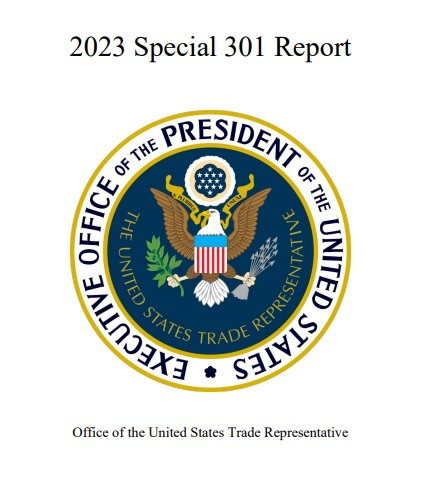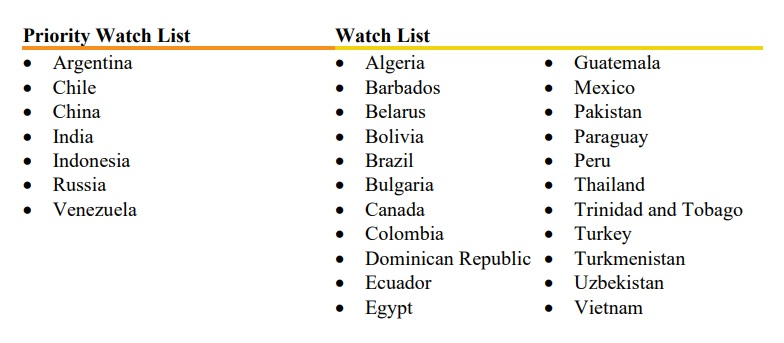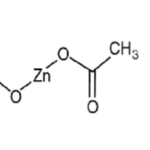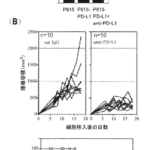1.スペシャル301条報告書(Special 301 report)とは
スペシャル301条報告書(Special 301 report)とは、1974年米国通商法182条(IDENTIFICATION OF COUNTRIES THAT DENY ADEQUATE PROTECTION, OR MARKET ACCESS, FOR INTELLECTUAL PROPERTY RIGHTS)に基づき、知的財産の保護と執行の世界的な状況について議会が義務付けている年次レビューの結果を反映したものであり、知的財産の保護と執行の適切性と有効性について問題のある国を、問題の大きな順から「優先国(priority foreign country)」、「優先監視国(priority watch list)」、「監視国(watch list)」の3段階に指定しています。このうち「優先国(priority foreign country)」については調査及び当該国との協議を行い、改善が見られない場合には対抗措置をとることができると規定されています。
2.2023年スペシャル301条報告書(2023 Special 301 Report)
世界知的財産の日(World IP Day)である2023年4月26日、米国通商代表部(United States Trade Representative; USTR)は「2023年スペシャル301条報告書(2023 Special 301 Report)」を公表しました。
- 2023.04.26 USTR press release: USTR Releases 2023 Special 301 Report on Intellectual Property Protection and Enforcement
2023年スペシャル301条報告書には、USTRが100を超える貿易相手国について調査した結果が詳述されており、いわゆる「THE 2023 SPECIAL 301 LIST」に挙げられた国は以下のとおりとなります。
主に医薬品分野の話題で気になった内容としては、以下の事項が挙げられます。
- COVID-19パンデミックと知的財産に関する事項においては、USTRは、米国国際貿易委員会(ITC)に対し、COVID-19診断薬および治療薬に関する調査を実施し、需要と供給、価格帯、検査と治療の関係、生産とアクセスに関する議論の参考となる市場力学に関する情報を2023年10月17日までに報告するよう要請したこと
- 「優先監視国(priority watch list)」に指定された中国に関しては、いくつかの前向きな進展を歓迎する一方で様々な長年の問題についての懸念の声があり、知的財産の問題に対処することを目的とした改革のペースは鈍化し、知的財産権を中国市場の優位性に結びつけるという中国当局の声明は依然として強い懸念を引き起こしること
- 2022年度に米国国境で押収された偽造医薬品の原産国の上位は、中国、インド、トルコでであり、OECDとEUIPOによる最近の調査では、中国、インド、インドネシア、パキスタン、フィリピン、ベトナムが、世界的に流通している偽造医薬品の主要な供給元であることが判明していること
- 「監視国(watch list)」に指定されたカナダに関しては、医薬品の販売承認取得の遅れに対する特許期間回復を規定する制度が、期間、適用性、保護範囲において制限があること
- 2022年2月にロシアが計画的かついわれのないさらなるウクライナ侵攻を行ったため、ウクライナのスペシャル301条の審査は引き続き中断していること
3.日本の薬価制度の透明性・予測可能性の欠如への懸念に言及
日本については、監視国としてリストには挙げられていませんが、報告書の中で、革新的な医薬品の価格設定や償還政策に関する日本の不透明さについての懸念をステークホルダーが長年表明していることや、日本が2021年から実施している毎年薬価改定の透明性・予測可能性の欠如、これは予想以上に多くの医薬品に適用されており、評価システムに関して有意義なステークホルダーの意見が反映されていないことへの懸念が述べられています(以下に該当部分を抜粋)。
Pharmaceutical and Medical Device Innovation and Market Access
・・・
Among other examples, USTR engagement in the past year included:
・・・
- Engaged with Japan to ensure transparency and fairness, including by providing meaningful opportunities for interested stakeholders to provide input regarding changes to pricing and reimbursement policies;
・・・
The IP-intensive U.S. pharmaceutical and medical device industries have expressed concerns regarding the policies of several trading partners, including Algeria, Australia, Brazil, Canada, China, Colombia, Japan, Korea, New Zealand, Russia, Saudi Arabia, Tunisia, and Turkey, on issues related to pharmaceutical innovation and market access. Examples of these concerns include the following:
・・・
- Stakeholders have long expressed concerns about Japan’s shortcomings in terms of transparency, especially including meaningful stakeholder input regarding pricing and reimbursement policies for advanced medical devices and innovative pharmaceuticals. Other concerns raised by stakeholders relate to a reported lack of meaningful stakeholder input in the development of a health technology assessment system, as well as a lack of transparency and predictability associated with Japan’s implementation in April 2021 of annual repricing for drug reimbursement, which applies to a larger-than-expected range of products.
4.提出された意見書
連邦官報の公示(The Federal Register notice)に対応して提出された意見書(71の非政府関係者と17の外国政府から提出が含まれている)は、www.regulations.gov(docket number: USTR-2022-0016)で一般公開されています。
- 2022.12.15 Federal Register notice (USTR-2022-0016): Request for Comments and Notice of a Public Hearing Regarding the 2023 Special 301 Review
- Posted comments: https://www.regulations.gov/document/USTR-2022-0016-0001/comment
これらパブコメの公開資料は、世界中の知的財産の保護と執行の適切性と有効性について、様々なステークホルダーがどのような事項に懸念を抱いているのか、また海外政府がどのように考えているのかを知ることができるとても良い参考資料集ともいえます。
以下に、日本の医薬産業における知的財産に関して懸念事項を指摘している意見書を一部抜粋しました。薬価制度、パテントリンケージ、特許権存続期間延長登録制度、医薬品データ保護制度に関する問題点を指摘する声があがっていることがよくわかります。
(1)Comment from Biotechnology Innovation Organization (BIO)
Response to Questions Biotechnology Innovation Organization
PDF 3ページから日本のパテントリンケージについての問題が指摘されています。
4. Your submission notes developments from 2020 concern Japan’s Ministry of Health (MHLW) that “undermined the predictability of patent protections… by approving multiple generic versions even though the Japan Patent Office had upheld two of the four claims on the underlying method of use patent.” Are there additional examples since 2020?
This specific example was used to illustrate how BIO members with IP assets in Japan face some degree of uncertainty that well-functioning and effective patent enforcement systems are designed to avoid.
There are other patent enforcement challenges in Japan relevant to BIO members such as with regard to obtaining injunctive relief before potentially infringing products are allowed to enter the market.
BIO welcomes the opportunity to provide specific examples of these concerns for the Special 301 Subcommittee consideration in future meetings.
(2)Comment from United States Chamber of Commerce
Comment from United States Chamber of Commerce
PDF 65ページから日本の薬価制度やパテントリンケージについての問題が指摘されています。
Revisions to the Price Maintenance Premium (PMP) System
・・・
In 2021, the average price cut on covered products was 5.2 percent (before application of the PMP) and is expected to be similar or worse in future years. This decision not only deviates from the 2016 four-Ministers agreement which stated that only the minority of products with a large yakkasa would be subject to the off-year price revision, but it also ignores the discussions at Chuikyo, the health care policy advisory board to the Minister of Health, Labour, and Welfare (MHLW). With this non-transparent process, we also understand that there were extremely limited opportunities for meaningful engagement with relevant business stakeholders, underscoring the overall concerns we have regarding the transparency and predictability of the Japanese market for innovative medicines.
・・・
Patent Enforcement
・・・
However, actions by the MHLW cast doubt on the future predictability of Japanese IP protections. Specifically, while MHLW appropriately takes the position that it should not arbitrate patent disputes, in 2020, it unilaterally determined that it was appropriate to approve multiple generic versions of an innovative product, even though the Japan Patent Office (JPO) had upheld two of the four claims on the underlying method of use patent. In other words, MHLW independently decided to interpret whether the upheld patent claims covered the innovative product.
・・・
In short, this situation creates significant uncertainty for innovators and generic manufacturers alike and could ultimately result in products being prescribed to Japanese patients that ultimately have to be withdrawn from the market based on the outcome of the pending litigation. It is exactly this uncertainty that well-functioning and effective patent enforcement systems are designed to avoid.
(3)Comment from PhRMA
Comment from Pharmaceutical Research and Manufacturers of America(Posted by the Office of United States Trade Representative on Jan 31, 2023)
48ページ(PDF 52ページ)から、日本を「優先国(priority foreign country)」に指定することを要請しています。このことから、PhRMA(米国研究製薬工業協会)の日本への極めて厳しい態度がうかがえます。薬価制度に関連する問題点のほか、特許権存続期間延長登録制度やパテントリンケージについての問題も指摘されています(以下は一部抜粋)。
- Patent term restoration (PTR): PhRMA members appreciate Japan’s PTR laws, as they provide term extensions for subsequent marketing approvals for additional indications or medical uses, or modifications of previously approved products. The Japanese law acknowledges the value that additional approvals can provide to patients. However, the laws as currently interpreted by the Japanese Patent Office (JPO) often result in extensions for subsequent marketing approvals which are shorter in term than the extensions for the original approval and can thus act as a disincentive to conduct research on additional medical uses and indications, including new formulations for an approved product.
- Effective patent enforcement: Actions by the MHLW to approve generic versions of an innovative product during ongoing litigation raises concerns for industry as to Japan’s commitment to effectively enforce patents. Further, while injunctive relief is typically available in Japan, such relief can take months to secure, thereby frustrating the ability of the innovator to seek an injunction before potentially infringing products are allowed to enter the market.
Comment from PhRMA(Posted by the Office of United States Trade Representative on Mar 8, 2023)
USTRからの質問に対するコメント(Mar 8, 2023)PDF 最初のページから、日本について懸念事項が説明されています。
1. Your submission requests that USTR designate Japan as a Priority Foreign Country. Please explain how the acts, policies, and practices of Japan are more problematic for your members than countries that your submission requests be placed on the Priority Watch List, such as China, India, and Russia?
Japan is the second largest market in the world for innovative medicines, the fourth largest trading partner with the United States and a critical player in the global biopharmaceutical innovation ecosystem. Since 2016, the Japanese Government has implemented more than 50 pricing rule changes, which are often unique in the world, disproportionately focused on patented medicines and commercially significant.
For example, as a result of non-scientific and discriminatory revisions to the Price Maintenance Premium (PMP), many globally leading U.S. products were deemed non-innovative under the new criteria and stripped of their PMP eligibility. Moreover, based on discriminatory criteria, globally leading U.S. companies with qualifying products were not deemed sufficiently innovative to qualify for the full benefit of the PMP compared to domestic companies.
Japan also moved away from its former system of biennial price cuts to an annual system, with the combined effect that approximately half of patented medicines are subject to annual price cuts. Even products not subject to annual price cuts can receive large, ad hoc price cuts based on complex market expansion repricing rules that have become more onerous and unpredictable in recent years. No developed country cuts prices on patented medicines as often as Japan.
In addition to these pricing rule changes, polices are often developed, interpreted and implemented in ways that lack the basic tenets of transparency and due process expected from an advanced economy like Japan. There are few formal attempts by decision-making bodies to seek input from stakeholders, let alone a notice and comment period for new rules, and industry organizations are generally provided only a matter of minutes to make statements at government hearings.
Finally, actions by the MHLW in 2020 to approve generic versions of an innovative product even though the Japan Patent Office had upheld two of the four claims on the patent identified by the innovator as relevant to its product, raise concerns for industry as to Japan’s commitment to effectively enforce patents.
The combined effect of these actions has made the Japanese system unpredictable and unsupportive of innovation, resulting in negative growth and a decline in domestic R&D investment, clinical trials and the timely availability of new medicines for Japanese patients. Given the severity and nature of the challenges described in our submission, PhRMA requests that USTR and other federal agencies use all available tools to remedy these serious concerns.
(4)Comment from Alliance for Trade Enforcement
Comment from Alliance for Trade Enforcement
15ページから日本の薬価制度やパテントリンケージについての問題が指摘されています。
C. Biopharmaceutical Market Access
Since December 2017, Japan has announced a number of new policy proposals as part of a drug-pricing policy package. As a result, the number of innovative products that qualify for the Price Maintenance Premium (“PMP”) System has decreased significantly. AFTE is also concerned that, under the new company requirements, fewer U.S. biopharmaceutical companies will qualify for the full benefit of the PMP System. Moreover, revised eligibility criteria are unique, non-science based, and disadvantage U.S. companies in violation of Japan’s WTO obligation to provide national treatment to U.S. firms.
Moreover, in December 2020, Japan announced a new rule that applies annual price cuts effective April 1, 2021, to all medicines with more than a 5 percent difference between the government reimbursement price and the surveyed market price. These cuts far exceed anything that the Ministry of Health, Labour and Welfare (“MHLW”) proposed for discussion.
In addition, in April 2019, Japan implemented a new Health Technology Assessment (“HTA”), which revises the price premium granted at the launch of innovative products and is inconsistent with international norms. As of January 2023, 39 products are under consideration or have been evaluated by the HTA, including two products that do not meet HTA criteria. AFTE remains concerned that this new assessment system denies producers fair value for innovation.
D. Patent Enforcement
While AFTE commends Japan’s reliable IP protections, actions by the MHLW have cast doubt on the future predictability of Japanese IP protections. Specifically, in 2020, the MHLW unilaterally determined that it was appropriate to approve multiple generic versions of an innovative product, even though the Japan Patent Office (“JPO”) had upheld two of the four claims on the underlying method of use patent. Therefore, these products will be able to enter the market as soon as MHLW adds these products to the National Health Insurance price standard list. AFTE is concerned that this will create significant uncertainty for innovators and generic manufacturers alike.
(5)Comment from National Association of Manufacturers
Comment from National Association of Manufacturers
33ページから日本についての薬価制度の問題のほか、パテントリンケージ、特許権存続期間延長登録制度、医薬品データ保護制度についての問題が指摘されています。
In addition, manufacturers are concerned about patent enforcement, given implementation issues with Japan’s patent linkage system illustrated in recent government decisions. In late 2020, MHLW ignored findings of the Japanese Patent Office by issuing multiple generic versions of an on-patent product even though the JPO had upheld two of the four claims on the underlying method of use patent. Despite current litigation in Japanese courts against the approved generics, MHLW permitted those products to enter the market in December 2020, before any ruling on injunctive relief. These actions, and their surrounding legal uncertainty, have created significant uncertainty for innovative and generic manufacturers. These actions sent damaging signals about Japan’s commitment to innovation and about its commitment to effective, well-functioning patent enforcement systems. Each of these developments undermines confidence in Japan’s commitment to innovation and R&D needed to create and bring new innovative products to market, as well as the effectiveness of its patent enforcement systems.
Manufacturers note other areas where improvements to the Japanese patent regime are also needed, including improvements to patent term adjustments to cover unreasonable delays in the issuance of patents and reforms to extend and clarify regulatory data protection for key innovative sectors. Manufacturers have raised concerns about current JPO procedures in considering patent term restoration for subsequent pharmaceutical product approvals. Currently, JPO provides an extension period based only on what is considered “necessary testing” for the subsequent approval. This practice often means uneven extensions, with initial approval periods being longer than subsequent extensions. In practice, this approach can act as a disincentive to conduct research on additional medical uses and indications, including new formulations for an approved pharmaceutical product, and thus weakens Japan’s innovation ecosystem. Further, Japan has failed to implement legislation establishing a regulatory data protection system. While Japan’s system generally provides eight years of regulatory data protection, it has yet to formally establish such protection through legislation that would create more certainty and predictability for innovators and support investment in innovative manufacturing sectors.
5.まとめ
2023年スペシャル301条報告書の中で、革新的な医薬品の価格設定や毎年薬価改定の透明性・予測可能性の欠如といった日本の問題に対してステークホルダーが懸念を表明していることが述べられています。ステークホルダーからの意見書を見ると、日本の薬価制度、特許権存続期間延長登録制度、パテントリンケージ、医薬品データ保護制度についての問題が指摘されており、なかには、日本を「優先国(priority foreign country)」に指定することを要請する意見書もありました。
日本政府は、この報告書や意見書での指摘を真摯に受け止め、各制度の改善に向けた具体的な検討を進める必要があるのではないでしょうか。
指摘された問題点について、当ブログで取り上げた以下の関連記事もご覧ください。
パテントリンケージ



医薬品データ保護制度

特許権存続期間延長登録制度

薬価制度






コメント